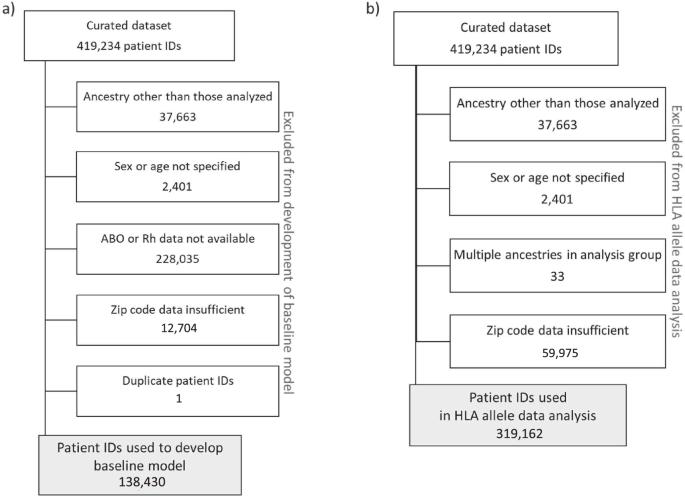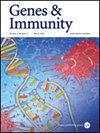在现实世界的大型队列中,HLA遗传学与SARS-CoV-2感染之间的关系
IF 4.5
3区 医学
Q1 GENETICS & HEREDITY
引用次数: 0
摘要
人类白细胞抗原(HLA)区域的遗传变异被认为影响多种传染病的易感性和严重程度。一些研究已经探索了HLA遗传与SARS-CoV-2感染之间的可能关系,尽管结果不一,样本量小,难以控制暴露风险,因此难以得出确定的结论。本文对419234名受试者的HLA基因型数据和COVID-19 PCR检测结果进行了研究。进行基线分析以检查非hla因素与COVID-19阳性的相关性。然后,进行多变量逻辑回归,包括单个和成对HLA等位基因,然后对基线分析中的重要因素进行校正。在所有研究的祖先群体中,社会经济地位和暴露风险的指标与COVID-19阳性显著相关。41个HLA单等位基因与COVID-19阳性有显著相关性;在控制了社会经济地位和暴露风险后,只有8个显著的关联仍然存在。此外,校正后的2个HLA等位基因对与检测阳性相关。在所有变量中,社会经济地位的影响最大。这项研究的结果表明,由于混杂因素,许多(如果不是全部)报道的HLA等位基因与SARS-CoV-2感染之间的关联可能是虚假的。本文章由计算机程序翻译,如有差异,请以英文原文为准。

Association between HLA genetics and SARS-CoV-2 infection in a large real-world cohort
Genetic variation in the human leukocyte antigen (HLA) region is thought to influence susceptibility to and severity of a variety of infectious diseases. Several studies have explored a possible relationship between HLA genetics and SARS-CoV-2 infection, although mixed results, small sample sizes, and difficulty controlling for exposure risk have made it difficult to draw firm conclusions. Here, a dataset of 419,234 subjects with HLA genotype data and COVID-19 PCR test results was studied. A baseline analysis was performed to examine the association of non-HLA factors on COVID-19 positivity. Then, multivariate logistic regressions, incorporating single and paired HLA alleles, were performed and then corrected for significant factors from the baseline analysis. Proxies for socioeconomic status and exposure risk were significantly associated with COVID-19 positivity across all ancestry groups studied. Forty-one single HLA alleles displayed significant association with COVID-19 positivity; after controlling for socioeconomic status and exposure risk, only eight significant associations remained. Additionally, two HLA allele pairs were associated with test positivity after correction. Of all variables, socioeconomic status showed the greatest effect size. The results from this study suggest that many, if not all, of the reported associations between HLA alleles and SARS-CoV-2 infection may be spurious, owing to confounding factors.
求助全文
通过发布文献求助,成功后即可免费获取论文全文。
去求助
来源期刊

Genes and immunity
医学-免疫学
CiteScore
8.90
自引率
4.00%
发文量
28
审稿时长
6-12 weeks
期刊介绍:
Genes & Immunity emphasizes studies investigating how genetic, genomic and functional variations affect immune cells and the immune system, and associated processes in the regulation of health and disease. It further highlights articles on the transcriptional and posttranslational control of gene products involved in signaling pathways regulating immune cells, and protective and destructive immune responses.
 求助内容:
求助内容: 应助结果提醒方式:
应助结果提醒方式:


